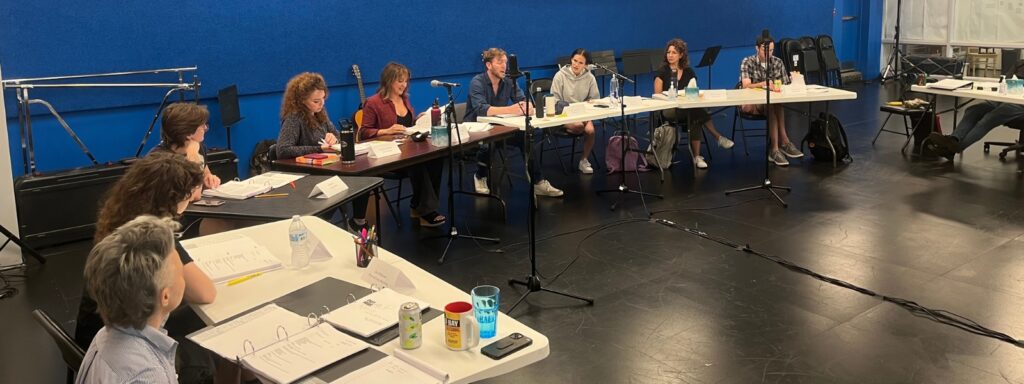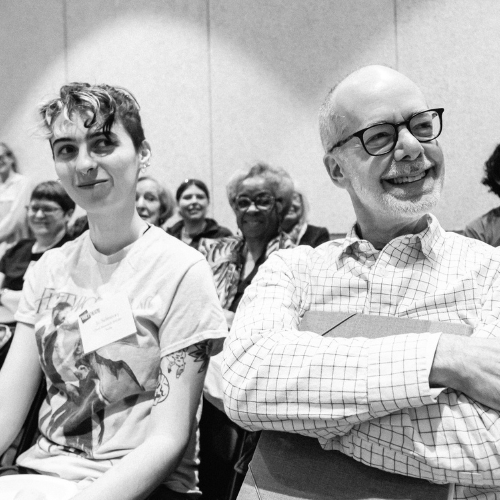My Time in the Room: Out Here

In. Hold. Out.
My skin was buzzing. I could feel the churning in my gut all the way up into the back of my throat. Dry mouth. I watched as my leg jostled the music stand in front of me, nearly knocking the white binder balanced on top of it onto the scuffed black stage floor, and tried to remind myself to just breathe. It was June 2023, I had just finished my first year of college, and being a part of Out Here felt as exhilarating as it was anxiety inducing.
I was introduced to Out Here through a class taught by Leslie Buxbaum, David J. Levin, and Erin McKeown: (re)Queering the American Musical. One day, near the end of the school year, I received an email from Leslie with the subject line “Workshop reader?”. In it, I was invited to read the stage directions for Out Here in a workshop that would be performed in Theater West at the Logan Center after a week-long rehearsal process. Agreeing to do so served as my introduction to the anxiously exhilarating world of new musical development.

There is something precious about a workshop, particularly when it comes to the development of new work, because workshops are meant to be imperfect. They offer opportunities to experiment; to take a rough draft and render it even rougher. They are places for the resulting mess to be instructive, rather than destructive. They are places for new discoveries to emerge and emerge and emerge.
The first Out Here workshop was just that– a living, breathing experiment full of discoveries. I felt like a real collaborator in that process, despite being the least experienced member of the team. I could observe, analyze, and perform, all at the same time. After the workshop was presented, it was just over a year and a half before I became directly involved with the project again. This time, it was at Court Theatre. The two workshops I participated in at Court included discussions facilitated by Director Chay Yew, where we (the company) explored our reactions to the narrative, sharing personal anecdotes and comparing experiences across generational lines. These conversations caused me to reflect on my own identity as a queer person, particularly as one only recently legally considered an adult.
A line that has always stuck with me from Out Here is when Robin tells Dawn, “You missed the hard.” In the context of the show, Robin is referring to the decades Dawn spent crafting a heteronormative family unit while Robin was experiencing the turmoil of being out for decades prior. Through this exchange, Out Here questions what it means to emerge as a queer person after some of the hardest parts associated with being recognized as such have passed.
Frankly, I feel like I’ve also missed much of the “hard.” I didn’t live through the height of the AIDS epidemic. Gay marriage was legalized in the United States by the time I was 10 years old. I was fortunate enough to grow up with an immediate family that was largely accepting of my identity. There exist new and lingering “hards” associated with queerness nowadays, of course, but it is easy to compare “hards” and recognize that I’ve had a relatively easy go of it. Does this mean that my queer identity is less valid compared to someone like Robin? I think not, but it does mean that “queer” means something different for us. Building an intergenerational queer community in spite of that difference while still recognizing its existence is a challenge worth undertaking, in my opinion.
But what I find most special about Out Here lies not solely in its exploration of this complex yet achingly familiar queer narrative, but in its “queering” of the structure of a musical altogether. Out Here constantly grapples with what it means to sing, speak, and take up space onstage. There are problems that cannot be solved through singing an “I want” song until an epiphany hits, conversations that aren’t made easier by setting them to a musical underscore, and characters that don’t simply disappear when they go offstage. The “hard” cannot simply be skipped over; it must be contended with and struggled through in order to find a resolution. Dramaturgically, these thematic and structural tensions and resonances are the juiciest, and they are what I believe makes this project truly exceptional.
Dance dramaturg Katherine Profeta writes, “The dramaturg’s activity [is] one of continuous motion– between roles, points of view, physical locations.” Being a part of the development of Out Here has allowed me to embody this movement, literally shifting roles, perspectives, and locations as I have been invited back to this project time and time again. I will always consider myself privileged to have had the opportunity to work with such incredible collaborators, and am filled with that same exhilarating anxiousness as I look forward to my role on the show as it goes into production in the spring. Theatrical time may be compressed, but I can’t help but selfishly want to stretch the time I get to spend with Out Here for just a breath longer.